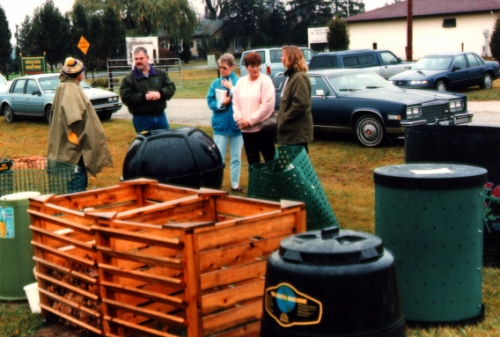Leaves compost: fall is a great time to add it to gardens
Composting instead of burning provides many benefits for you and your environment.
 Pumpkins are being turned into jack-o-lanterns, fall flowers are almost done blooming and the leaves on the trees are falling to the ground. Gardens are at their end and most gardeners have begun the annual ritual of clearing out dead plants. Compost bins everywhere are being enriched with fall bounty of spent plants and fall leaves. In some places, the annual burning of the leaves ritual has begun – but note that composting instead of burning prevents wildfires, protects air quality, improves soil structure, balances the soil ecosystem and nourishes plants.
Pumpkins are being turned into jack-o-lanterns, fall flowers are almost done blooming and the leaves on the trees are falling to the ground. Gardens are at their end and most gardeners have begun the annual ritual of clearing out dead plants. Compost bins everywhere are being enriched with fall bounty of spent plants and fall leaves. In some places, the annual burning of the leaves ritual has begun – but note that composting instead of burning prevents wildfires, protects air quality, improves soil structure, balances the soil ecosystem and nourishes plants.
If you don’t have a compost bin now is a great time to begin one. If you are a composter already emptying out the finished compost from the summer onto the garden and refilling the bin with garden debris is an annual soil enriching event. If you are a leaf burner, consider the alternative to burning which is composting. You will receive many added benefits, but first a word about burning leaves in Michigan.
It is illegal to burn leaves in many populated areas in Michigan that have more than 7,500 residents. There are many smaller communities with ordinances that also ban burning. Check out your local city, village or township regulations before burning. There are new rules about burning trash in Michigan as well. Burning debris in piles and burn barrels are a major cause of wildfires.
Air quality is affected from burning leaves and trash because they create a low temperature burn at ground level which does not completely incinerate particles and toxic substances. This is damaging to Michigan air quality. Studies show a connection between high levels of participate pollution released from smoke with allergies, chronic coughs and other respiratory illness especially in the young and elderly.
Composting is an easy alternative. All you need is a bin or pile located out of direct sunlight. Add two or three parts brown and dry items, such as dry leaves, straw, pine needles or shredded paper, to one part greens, such as grass clippings, weeds and kitchen scraps. Materials should be moistened and feel moist like a wrung out sponge, and warm to touch (except in winter months). The pile should be turned every few days to every few weeks so the outside layers are exchanged with the materials in the center of the pile. It is ready to be used when it looks dark and crumbly and few of the starting ingredients are visible. Larger items such as sticks and corn cobs may need to be put back in for a second go or broken down into smaller pieces so they can decompose faster.
What are the benefits of composting besides getting some fresh air and exercise? Compost provides many benefits to your yard, garden and the environment. Good quality compost supplies organic matter, stable nutrients and beneficial microorganisms.
These additions enhance soil in the following manner:
- It develops soil tilth through improving soil structure and porosity by adding organisms whose activities increase the sticking power of particles.
- It helps to reduce the density of clayey (heavy) soils by adding organic matter that increases air space and drainage.
- It improves the moisture holding capacity of sandy (light) soils by shading the soil from the sun and adding organic matter that will help to hold water and nutrients.
- It increases cation exchange capacity (CEC) through adding organic matter to your soil that act as ion transfer stations.
- It buffers soil pH through helping to stabilize and regulate at a more neutral level.
- It increases and feeds soil microorganisms thus increasing the proliferation of beneficial soil microorganism populations.
- It encourages vigorous root growth allowing more effective use of nutrients by plants through slow release of nutrients as the organic matter continues to decompose.
- It reduces nutrient loss from leaching through increase of water holding capacity.
- It reduces soil erosion through stabilizing soils structure.
- Compost diminishes rain drop splash effects and soil crusting by allowing better drainage and holding the soil in place.
- It aids seed germination through increased soil ecology health.
- It reduces summer soil temperatures by shading roots and holding water longer in dry soils.
Composting is the best alternative to managing backyard waste and kitchen food scraps. It reduces the amount of waste you produce and provides a beneficial soil amendment product. For more information about composting and gardening or wildfire protection visit Gardening in Michigan and Michigan Firewise...



 Print
Print Email
Email

